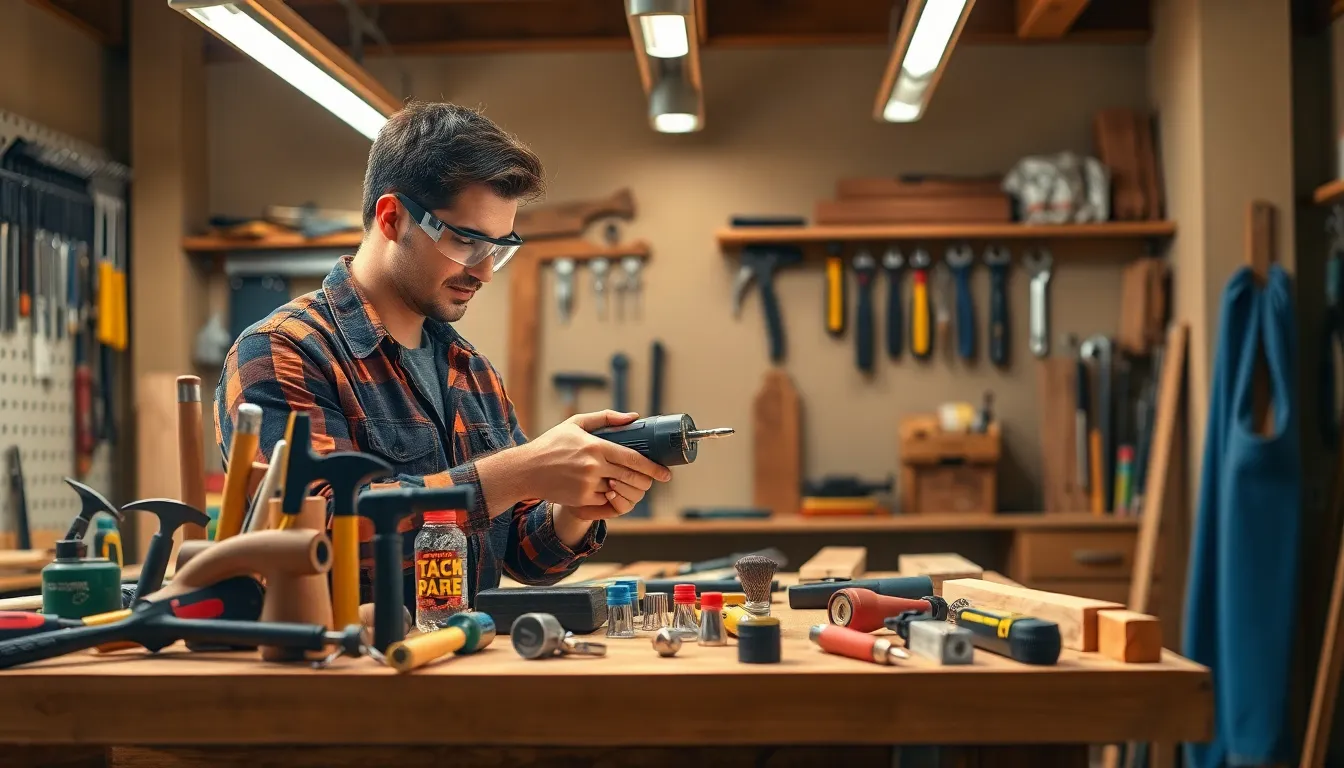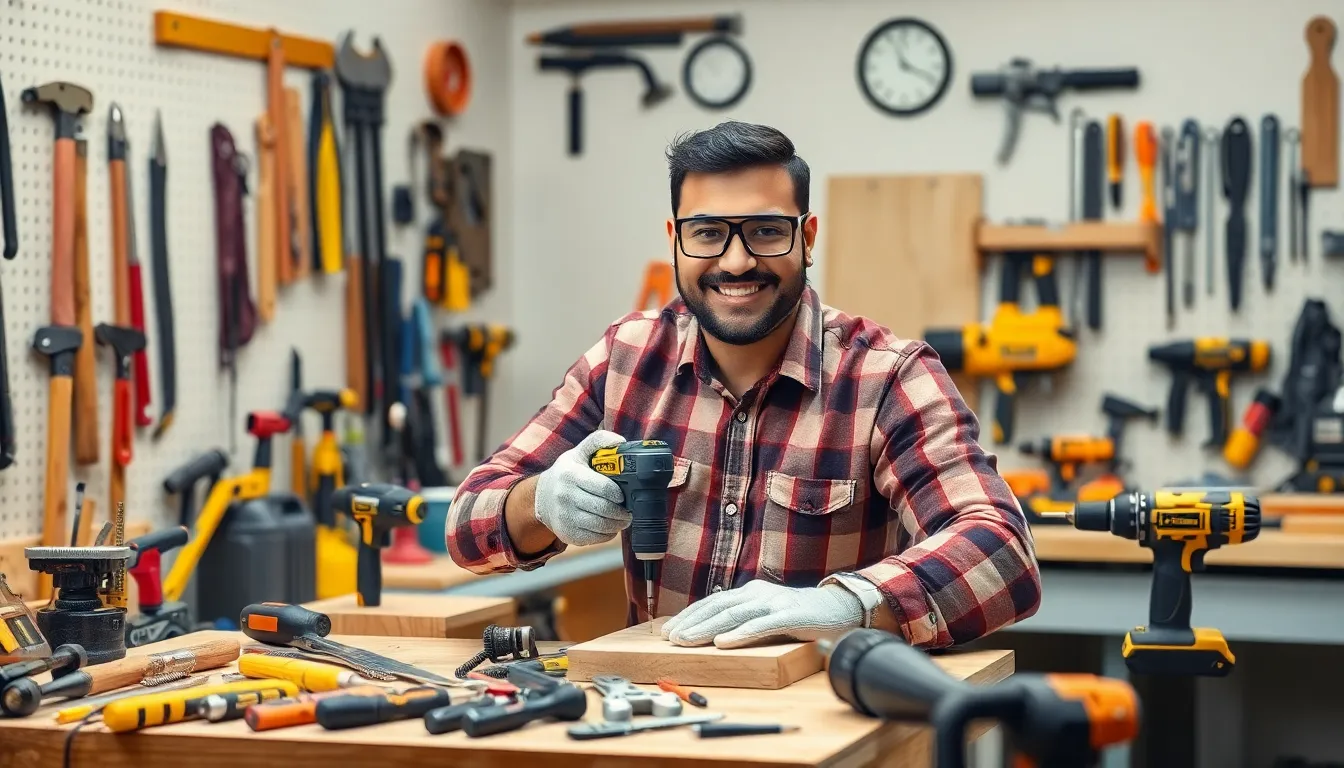Every workshop needs its trusty tools and equipment, but let’s face it—some of them can be as confusing as assembling IKEA furniture without the instructions. From power drills that could double as jet engines to hand tools that seem to have a mind of their own, the right gear can make or break a project.
Imagine tackling a DIY project with the confidence of a seasoned pro, all because you’ve got the right tools at your fingertips. Whether it’s a hammer that feels like an extension of your arm or a saw that slices through wood like butter, having the right equipment makes every task a breeze. Dive into the world of workshop tools and discover how to elevate your skills while keeping the fun alive.
Table of Contents
ToggleOverview of Workshop Tools and Equipment
Workshop tools and equipment encompass a wide range of items essential for various projects. Hand tools constitute a fundamental category, including items like hammers, screwdrivers, and pliers. Power tools, on the other hand, enhance efficiency and precision, featuring drills, saws, and sanders. Each type serves a specific purpose, allowing users to tackle different tasks effectively.
Safety gear plays a crucial role in any workshop environment. Items like safety goggles, gloves, and ear protection help minimize risks while working. Investing in high-quality safety equipment ensures a secure workspace.
Storage solutions also form an integral part of workshop organization. Racks, cabinets, and toolboxes facilitate easy access to tools and materials. Proper organization prevents time wastage and keeps the workspace tidy.
Materials such as lumber, metal, and plastics help complete various projects. Selecting quality materials influences the final outcome, promoting durability and aesthetics. Understanding material properties assists in choosing appropriate items for specific tasks.
Maintenance tools contribute to the longevity of equipment. Items like lubricants, cleaning products, and replacement parts keep tools in optimal condition. Regular maintenance ensures reliable performance and prolongs the lifespan of essential equipment.
Finally, workshop accessories enhance the overall functionality of the space. Items like clamps, workbenches, and measuring devices support various projects, offering stability and accuracy. Choosing the right accessories complements the main tools, leading to improved results in DIY endeavors.
Essential Hand Tools

Essential hand tools form the backbone of any well-equipped workshop. They enable individuals to tackle a variety of tasks with precision and confidence.
Common Hand Tools
Common hand tools include hammers, screwdrivers, pliers, and wrenches. Hammers come in various types, including claw, ball-peen, and sledge, each suited for specific jobs. Screwdrivers, available in both flat-head and Phillips designs, are crucial for fastener-driven tasks. Pliers offer gripping and cutting capabilities, while adjustable wrenches provide versatility for different bolt sizes. These tools are essential for most DIY projects, ensuring effective and efficient results.
Specialized Hand Tools
Specialized hand tools cater to specific tasks in the workshop. For example, chisels help carve wood with precision, while utility knives simplify cutting various materials. Pipe wrenches are ideal for plumbing projects, and torque wrenches ensure accurate tightening. Scissors and shears serve distinct cutting purposes, making them invaluable for tasks involving fabric or sheet metal. Each specialized hand tool enhances functionality, supporting a range of projects demanding fine detail and accuracy.
Power Tools for the Workshop
Power tools play a vital role in enhancing efficiency and precision within a workshop. They facilitate a range of tasks, making projects easier to tackle.
Types of Power Tools
Drills represent one of the most commonly used power tools, ideal for making holes in various materials. Saws, such as circular and jigsaws, provide versatile cutting options for wood, metal, and plastic. Sanders smooth surfaces, ensuring a polished finish, while grinders remove material and shape objects as needed. Routers specialize in hollowing out areas and creating decorative edges. Impact wrenches and nail guns expedite fastening processes, saving time and effort on projects. Each type offers specific capabilities, allowing individuals to choose tools best suited for their tasks.
Safety Considerations
Safety remains a top priority when using power tools. It’s essential to wear appropriate personal protective equipment, including goggles and hearing protection, to guard against hazards. Keeping the workspace organized minimizes trip hazards and enhances focus. Always ensure tools are well-maintained and sharpened, as dull tools can lead to accidents. Using proper techniques during operation reduces the risk of injuries. Familiarity with each tool’s manual and safety instructions fosters a responsible working environment. Understanding these safety considerations greatly contributes to a productive and secure workshop experience.
Workbench and Storage Solutions
Workbench and storage solutions significantly enhance workshop functionality. Selecting the right options ensures projects run smoothly and efficiently.
Workbench Types
Workbenches come in various types tailored for specific tasks. A sturdy workbench provides stability for heavy-duty projects, while folding models offer flexibility in smaller spaces. Adjustable height workbenches suit diverse user preferences, accommodating both standing and seated positions. Specialty workbenches include woodworking options with built-in vices and electronics benches designed for delicate components. Portable workbenches facilitate mobility, allowing users to bring tools and materials directly to the job site.
Storage Options
Storage options play a crucial role in maintaining an organized workspace. Tool chests provide ample space for both hand tools and accessories, while drawer organizers keep smaller items accessible. Wall-mounted pegboards allow easy visibility of frequently used tools, freeing workspace on benches. Shelving units enable efficient storage of large items, including lumber and power tools. Mobile storage carts combine mobility with organization, making frequently used equipment easy to transport. Prioritizing effective storage solutions fosters an efficient and clutter-free environment for various projects.
Maintaining Your Tools and Equipment
Regular maintenance extends the lifespan of tools and equipment, ensuring reliable performance. Cleaning the tools after use removes dust, debris, and residue that may cause wear. Sharpening blades on tools like saws and knives promotes effective usage, enhancing precision in cutting tasks.
Inspecting cords and batteries for wear helps identify potential hazards. Replacing worn parts promptly prevents issues down the line and maintains optimal function. Lubricating moving parts, such as hinges and sliding mechanisms, enhances performance by reducing friction.
Storage solutions also play a crucial role in tool maintenance. Storing tools in designated places, like toolboxes or wall-mounted racks, keeps them organized and minimizes damage. Using moisture-absorbing materials prevents rust on metal tools, extending their usefulness.
Regularly checking power tools for proper operation before use promotes safety and efficiency. Testing battery performance keeps power tools functioning, avoiding unexpected interruptions during projects. Following the manufacturer’s guidelines for maintenance ensures adherence to specific care requirements for each tool.
Keeping a maintenance log tracking service dates and replacements provides clarity on tool conditions. Prioritizing these practices enhances the overall workshop experience and boosts project outcomes. Simple maintenance tasks contribute significantly to the longevity of tools and equipment, reflecting the importance of care in supporting successful DIY endeavors.
Equipping a workshop with the right tools and equipment is vital for any DIY enthusiast. The combination of hand tools and power tools not only enhances efficiency but also empowers creativity. Prioritizing safety gear and effective storage solutions contributes to a productive workspace where projects can flourish.
Regular maintenance of tools ensures longevity and reliable performance, allowing individuals to focus on their craft without interruptions. By investing in quality materials and accessories, anyone can elevate their DIY experience. Ultimately, a well-organized and equipped workshop paves the way for successful and enjoyable projects, transforming ideas into reality.



